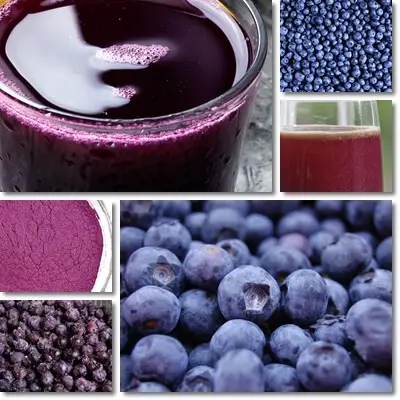What do you drink blueberry juice for? In terms of benefits for health, both immediate and long-term, what does blueberry juice bring to the table? Are there any measurable benefits to blueberry juice specifically? How much sugar in blueberry juice? What is blueberry juice good for?
1) Blueberry juice is a source of quick energy
Sometimes quick energy is what you need and drinking a glass of blueberry juice can get you just that.
A glass of blueberry juice will provide good amounts of sugar, and being mostly water with no fiber and virtually no fat or protein means that sugar will get absorbed into the bloodstream right away, raising blood sugar and energy levels almost instantly.

2) Blueberry juice combats hypoglycemia dizziness, palpitations and fainting
There are times when blood sugar levels drop too much and that causes side effects such as lightheadedness, dizziness, palpitations and even fainting.
Fruit juices are natural sources of sugar and perfect for restoring blood sugar to normal levels within minutes.
Unsweetened blueberry juice will get you around 7-8 grams of sugar for every 100 ml which can amount to 17-19 grams of sugar per cup of juice (240 milliliters). Something as simple as a glass of blueberry juice can save you from hypoglycemia and its side effects, all the while enriching your diet with healthy antioxidants.
3) Blueberry juice hydrates and boosts vitality
Blueberry juice is mostly water and will help keep you hydrated! Having a glass of unsweetened blueberry juice can help you stay on top of your fluid intake and make you feel good physically.
More important, blueberry juice will also get you small amounts of iron and B vitamins for a boost in vitality and energy levels.

4) Blueberry juice is good for high blood pressure
If you have high blood pressure, then blueberry juice is something you can definitely drink and do so safely without side effects for your condition. What makes blueberry juice good for high blood pressure is the fact that it’s very, very low in sodium. Actually, you can even say blueberry juice is virtually sodium-free.
One cup of pure blueberry juice at 250 milliliters has just 5 milligrams of sodium. To compare, the average adult person can have 2300 milligrams of sodium in a day.
That means that blueberry juice is something you can have safely as it won’t contribute measurably to your daily sodium intake; not just this, but you can substitute some other treat higher in sodium with a serving of blueberry juice to help you manage your condition better.
Another benefit of blueberry juice is that it also provides small amounts of potassium, an important electrolyte for blood pressure control. Just 240 milliliters will get the average adult 5.4% of all the potassium they need in a day to actively help lower blood pressure numbers that are too high.
5) Blueberry juice can stimulate appetite
If you’re lacking appetite, then having a glass of pure blueberry juice can help restore your appetite and stimulate eating. Blueberry juice contains organic acids that have a slight irritating effect on the stomach lining, stimulating the production of gastric juices. This creates a feeling of hunger and stimulates eating.
Fresh, unpasteurized blueberry juice that has its vitamin C content still intact further contributes to creating appetite. But you’ll have to read the label to determine if there is any vitamin C in your blueberry juice as commercial juices are pasteurized and pasteurization heat destroys vitamin C.
6) Blueberry juice is okay in a weight loss diet
A weight loss diet should never be a strict diet that excludes entire classes of foods. Taking into account the fact that treats are vital for one’s sanity, a glass of pure blueberry juice can qualify as an acceptable treat even when you’re on a diet.
Despite its sugar content, blueberry juice is actually not high in calories. A serving of 240 milliliters which is about a cup has only 100 kcal (kilocalories, calories). That’s not very much at all and can easily find room in any weight loss diet without compromising your diet goals.
7) Blueberry juice is anti-inflammatory
One of the biggest benefits of blueberry juice is its antioxidant content. What makes blueberries blue is a high content of purple and blue anthocyanin antioxidants. The same antioxidants are transferred from the fruit to the juice, and even when they’re not, blackberry concentrate, puree or juice is added which still provides the same types of antioxidants.
Studies have shown that anthocyanin antioxidants are strong anti-inflammatory agents and help lower levels of inflammation in the body by acting directly on inflammatory markers. Anthocyanins such as those found in blueberries and their juice have been documented to lower inflammatory markers ‘including serum high-sensitivity C-reactive protein, soluble vascular adhesion molecule-1, and plasma IL-1β’ (source).
More blueberry resources
Also see what are the benefits of eating blueberries everyday. If you usually use frozen blueberries for baking, pancakes or morning oatmeal, then you might like to know what is the nutritional value of one cup of frozen blueberries.
And finally, see what are the benefits of eating blueberries themselves.
Observations about blueberry juice
First off, it’s important to mention that there isn’t just one kind of blueberry juice – many different types exist with variations in nutritional value and benefits for health.
The most common is commercial blueberry juice whose main characteristic is it’s pasteurized.
But many vitamins are sensitive to pasteurization which means pasteurized juice will have lost a good chunk of its original nutritional value. And blueberries aren’t very nutritious to begin with anyway so that’s saying something.
To get a good picture of what is the nutritional value of the juice, see the nutrition facts for 100 grams of blueberries with percentages of daily values.
Some brands may add vitamins back to their juice, primarily vitamin C which is usually completely lost during the process, but also other vitamins, although that’s rare.
That will be specified on the label, both because of legal requirements and because it’s something that sells. Most commercial blueberry juice will also be made from blueberry concentrate, not actual fruit.
Just as important, not all blueberry juice is 100% pure. A lot of times what you’re getting is blueberry and some other juice, usually apple, but also lemon, or even lemonade, or mixed berry juice.
Even fruit purees may be added (e.g. blueberry, blackberry, banana). This is another aspect to consider when it comes to the benefits of blueberry juice.
What all of this means is that you cannot and will not get the exact same benefits from all kinds of blueberry juice simply because there are different kinds, some wildly different from others.
Ideally, look for products whose label says 100% or 100% pure blueberry juice or even better, organic. Raw or unpasteurized, or fresh, should come with more of the original nutritional value of the berries.
